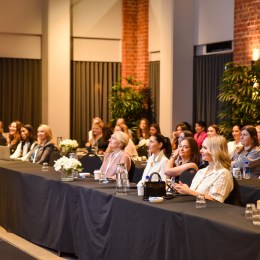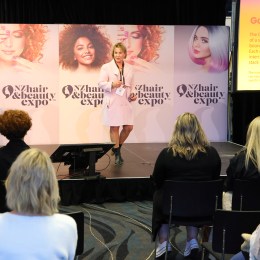Get to know the Sydney Face Doctor Founder and Emotional Female author ahead of BEAUTY&SPA Insiders.
Dr Yumiko Kadota will be joining this year’s BEAUTY+SPA Insiders event as a keynote speaker. As an industry-leading facial aesthetics doctor, founder of the Sydney Face Doctor clinic and author and Emotional Female, to say she’s got wisdom to share would be an understatement.
Below, SPA+CLINIC catches up with Dr Kadota. Keep reading to hear all about Dr Kadota’s career, the advice she’d give other females and women of colour wanting to enter the field, and what we can do to move towards greater equality in medicine.
What first drew you to a career in medicine?
In high school, I loved maths and science but I also knew that I wanted a career that would allow me to work with people – I think medicine is a good combination of those things. I am an Enneagram Type 2 – ‘Helper’ so I think intuitively I knew I would find a career that would allow me to look after others.
Where did you study and train?
I studied medicine at UNSW, graduating in 2010. I spent my first three years as a junior doctor in Melbourne before coming back to Sydney to work as a Plastic Surgery registrar.
As a female and a woman of colour, what issues have you faced while working as a doctor?
Being a woman, particularly in a male-dominated area like surgery, definitely had its challenges. I took the brunt of misogynistic jokes, and sometimes even racist comments. Asian women doctors in particular often get mistaken for nurses, cleaners, or cafeteria staff because of racist stereotypes about our roles. I would often be met with disbelief when I presented myself as the person who would be performing a patient’s operation.
What is the impact of mistitling and untitling female doctors? Why is it important for people to get these things right?
Untitling and mislabelling happens disproportionately to women, and particularly women of colour. While it might seem harmless, it not only undermines the years of education and training we have undergone, but also affects the way patients and colleagues perceive our credibility and authority. It contributes to the unconscious biases that put down women of colour and affects the way people behave towards us, and the potential for career growth and promotion to leadership positions.
Thinking about the current male-dominated landscape of medicine, do you have any thoughts on what needs to happen for us to move towards greater equality? What advice would you give to people wanting to create change on this front?
We have more women than men in medical schools, which means that we have the numbers. The issue is that there is a glass ceiling for women wanting to enter male-dominated specialties or leadership positions in medicine.
We need ’sponsors’ in the workplace who will actively promote competent and deserving women to these positions and more cultural awareness of the unconscious biases affecting women’s career progression. There may also need to be quotas initially until we can organically reach that equality.
What advice would you give to other women – and especially women of colour – who’d like to pursue a career in medicine?
Medicine is a very rewarding career, and I still wholeheartedly encourage any woman who is interested to pursue it. It’s important to be aware of the challenges and systemic toxicities, but not let them deter you from achieving your goals.
What are you now focusing on in your career since leaving the public hospital system?
I have since set up my own cosmetic skin clinic called ’Sydney Face Doctor’, offering injectables and radiofrequency skin treatments.
What is your approach to aesthetic treatments? How do you ensure a successful treatment outcome for each individual patient?
I offer non-surgical options, and honesty is an important aspect of my approach. While there are some highly effective treatments, there is a limit to how much non-surgical treatments can achieve – it won’t produce the same result as undergoing surgery.
However, for many people, it is an excellent alternative to going under the knife. The other important approach is building a long-term plan by assessing the overlying skin first before offering any injectables. This sometimes means having to delay treatments to optimise the skin quality first, but it ensures a much better result in the long term.
What are your personal favourite techniques or procedures to perform currently?
I love combining radiofrequency treatments with injectables. For example for those wanting tear trough fillers but have thin, crepey under-eye skin I will offer RF micro-needling first to improve the skin quality before jumping into any fillers. This means that they have a much better coverage of the filler and produces a better result.
What do you have planned for the future? Any more book releases on the horizon?
I enjoyed writing, but will be putting further book-writing on hold to focus on building my small business. I’m loving working in the cosmetic industry so far and hope to learn and grow in this space!
To hear Dr Yumiko Kadota speak on the topic of Being A ‘Female’ Doctor – How I Overcame Burnout, Sexism, and Inequality in the Medi-aesthetics Industry, buy your tickets for BEAUTY&SPA Insiders here.
Read SPA+CLINIC’s latest issue here:
There are 5 ways you can catch up with SPA+CLINIC
- Our quarterly print magazine, delivered to your door. Subscribe here.
- Our website, which is updated daily with its own completely unique content and breaking news.
- Our weekly newsletter – free to your inbox! Subscribe here.
- Our digital magazine – click here to view previous issues.
- Our social media – see daily updates on our Instagram, Facebook & Linkedin





